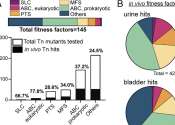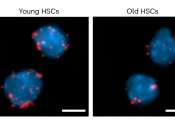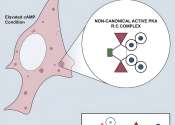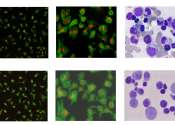Last update:
Cell & Microbiology news

Unraveling life's origin: Five key breakthroughs from the past five years
There is still so much we don't understand about the origin of life on Earth.
Cell & Microbiology
4 hours ago
0
16

How E. coli get the power to cause urinary tract infections
Through a quirk of anatomy, women are especially prone to urinary tract infections, with almost half dealing with one at some point in their lives.
Cell & Microbiology
May 3, 2024
0
20

Novel triple drug combination effective against antibiotic-resistant bacteria
Scientists at the Ineos Oxford Institute (IOI) have found a new potential combination therapy to combat antimicrobial resistance (AMR) by targeting two key bacterial enzymes involved in resistance. The study, "The Triple ...
Cell & Microbiology
May 3, 2024
0
6

Study finds microbiome changes dynamically and favors important host-relevant functions
All multicellular organisms—from the simplest animal and plant organisms to humans—live in close association with a multitude of microorganisms, the so-called microbiome, which colonize their tissues and live in symbiotic ...
Ecology
May 3, 2024
0
1

New discovery of a mechanism that controls cell division
Researchers at Umeå University, Sweden, have discovered that how a special protein complex called the Mediator moves along genes in DNA may have an impact on how cells divide. The discovery may be important for future research ...
Cell & Microbiology
May 3, 2024
0
44

For microscopic organisms, ocean currents act as 'expressway' to deeper depths, study finds
Some of the ocean's tiniest organisms get swept into underwater currents that act as a conduit that shuttles them from the sunny surface to deeper, darker depths where they play a huge role in affecting the ocean's chemistry ...
Ecology
May 2, 2024
0
47

Bioreactor processes and cryotechnologies improve active ingredient tests using human cell cultures
Many new drug candidates end up failing because they cause serious side effects in clinical trials even though lab tests involving cell cultures have been successful. This is a common occurrence if the cells used come from ...
Cell & Microbiology
May 2, 2024
0
5

Systematic testing of natural oils on in vitro skin models
For some years now, the trend in the cosmetics and skincare sector has been toward transparency and natural, sustainable ingredients. A growing number of consumers are rejecting cosmetics that contain petroleum-derived mineral ...
Cell & Microbiology
May 2, 2024
0
12

Antimicrobial peptide from cows shows potential for treating hypervirulent bacteria
University of Central Florida College of Medicine researcher Renee Fleeman is on a mission to kill drug-resistant bacteria, and her latest study has identified a therapy that can penetrate the slime that such infections use ...
Cell & Microbiology
May 2, 2024
0
27

Understanding cellular transcription responses to oxygen deprivation
A multiprotein complex is essential for regulating cellular responses to oxygen deprivation, a key feature of cancer, according to a Northwestern Medicine study published in the Proceedings of the National Academy of Sciences.
Cell & Microbiology
May 2, 2024
0
18

Archaea can be 'picky eaters': Study shows a group of parasitic microbes can change host metabolism
A parasite that not only feeds off its host, but also makes the host change its own metabolism and thus biology: NIOZ microbiologists Su Ding and Joshua Hamm, Nicole Bale, Jaap Damsté and Anja Spang have shown this for the ...
Cell & Microbiology
May 1, 2024
0
48

Researchers discover key functions of therapeutically promising jumbo viruses
Antibiotic medicines became a popular treatment for bacterial infections in the early 20th century and emerged as a transformational tool in human health. Through the middle of the century, novel antibiotics were regularly ...
Cell & Microbiology
May 1, 2024
0
26

Study: Airway hillocks challenge our understanding of lung biology
Airway hillocks are mysterious, flat-topped structures that were only recently identified within regular lung tissue, and their role in airway biology and pathology has previously been unknown.
Cell & Microbiology
May 1, 2024
0
21

Sourdough under the microscope reveals microbes cultivated over generations
Sourdough is the oldest kind of leavened bread in recorded history, and people have been eating it for thousands of years. The components of creating a sourdough starter are very simple—flour and water. Mixing them produces ...
Cell & Microbiology
May 1, 2024
0
35

Cell contraction drives the initial shaping of human embryos, study finds
Human embryo compaction, an essential step in the first days of an embryo's development, is driven by the contractility of its cells. This is the finding of a team of scientists from CNRS, Institut Curie, Inserm, AP-HP and ...
Cell & Microbiology
May 1, 2024
0
21

Discovery of an atypical heat shock factor, HSF5, involved in meiotic mechanisms has implications for male infertility
Kumamoto University researchers have identified a novel heat shock factor (HSF), designated as HSF5, which plays a crucial role in the completion of meiosis and the activation of genes essential for sperm formation. This ...
Cell & Microbiology
May 1, 2024
0
16

Fungal resistance in plants associated with heritable differences in microbiota abundances
Sunflowers aren't just beautiful symbols of summer—they are also economically significant, ranking as the fourth most important oilseed crop in the world, and new research suggests that some bacteria might help protect ...
Cell & Microbiology
May 1, 2024
0
1

Researchers find that calcium can protect potato plants from bacterial wilt
Scientists have discovered that calcium plays a significant role in enhancing the resistance of potato plants to bacterial wilt. This disease causes worldwide losses of potatoes costing $19 billion per year. The findings ...
Cell & Microbiology
May 1, 2024
0
2

Study uncovers the secret of long-lived stem cells
Nothing lives forever, but compared to other cells in the body, hematopoietic stem cells (HSCs) are remarkably long-lived. HSCs are blood-forming cells—they give rise to rapidly dividing progenitor cells, which in turn ...
Cell & Microbiology
Apr 30, 2024
0
60

How polyps of the moon jellyfish repel viral attacks on their microbiome
Bacteriophages, or phages for short, are viruses that infect bacteria and kill them through a lysis process. Phages can kill bacteria on or in a multicellular host organism, such as the polyp of the moon jellyfish. Phages ...
Ecology
Apr 30, 2024
0
37
More news

Biodegradable 'living plastic' houses bacterial spores that help it break down

A virus could help save billions of gallons of wastewater produced by fracking

Studies on Hainan Island rubber plantations reveal secrets of soil

Researchers discover new lantibiotic produced by staphylococci

Cartilage healing discovery in animal models could lead to new human therapies

Novel mechanisms for cleavage-independent activation of gasdermins revealed

Fruit fly helps unlock clues about how organs, tissue and cancer grow

Study details a common bacterial defense against viral infection
Other news

Nanotech opens door to future of insulin medication

Boeing's Starliner finally ready for first crewed mission

When injecting pure spin into chiral materials, direction matters

Lego-pushing bumblebees reveal insect collaboration dynamics

Advanced cell atlas opens new doors in biomedical research

Scientists regenerate neural pathways in mice with cells from rats

Giant virus discovered in wastewater treatment plant infects deadly parasite

Study suggests that cells possess a hidden communication system

Unveiling the mysteries of cell division in embryos with timelapse photography

Researchers unveil PI3K enzyme's dual accelerator and brake mechanisms

Chemist explores the real-world science of Star Wars

Cold sintering may rescue plastic, ceramics, battery components from landfills

















































